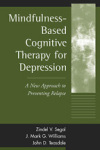With the 10-year anniversary of the publication of Mindfulness Based Cognitive Therapy for Depression nearly upon us, it is a good time to perhaps stop and reflect on where the field stands at this juncture.
 For the past decade John, Mark and I have been largely concerned with reaching the first milestone of treatment development – reliable evidence for MBCT’s effectiveness. Data from 6 Randomized Controlled Trials and 2 meta-analyses (Hoffman, 2010; Piet & Hoogard, 2011) now indicate that Mindfulness Based Cognitive Therapy is associated with a 50% reduction in depressive relapse risk as well producing symptom relief in anxiety disorders for both adults (Kim et al., 2010) and children (Semple & Lee, 2011).
For the past decade John, Mark and I have been largely concerned with reaching the first milestone of treatment development – reliable evidence for MBCT’s effectiveness. Data from 6 Randomized Controlled Trials and 2 meta-analyses (Hoffman, 2010; Piet & Hoogard, 2011) now indicate that Mindfulness Based Cognitive Therapy is associated with a 50% reduction in depressive relapse risk as well producing symptom relief in anxiety disorders for both adults (Kim et al., 2010) and children (Semple & Lee, 2011).
Having addressed the efficacy question, we are still left to ponder how exactly this multi-modal treatment achieves its benefits. For example, what is the relative contribution of cognitive therapy principles versus mindfulness practice to outcome? What about the role of kindness and compassion, both of which are implicit in the program and, as Willem Kuyken’s work suggests, may be one of the consistent gains reported by participants?
Clarifying mechanisms of action is of more than just academic interest, as it will likely inform the approach taken to training the next generation of MBCT practitioners. The fact that these are questions being asked shows how far we have come from the early days when MBCT was described as a form of attentional control training.
It is always hard to predict what the next 10 years will bring, but my bet is that efforts to disseminate MBCT via online technologies will start to have an impact. Online approaches may be a response to the fact that there are still far too few MBCT instructors and too many patients seeking care. The challenge for online MBCT will be to adapt to an internet friendly format, while holding onto the practice dimension, which however you slice it, always comes down to being a personal, non-electronically mediated experience. It should all make for a very interesting ride.
References
Hofmann SG, Sawyer AT, Witt AA, Oh D. The effect of mindfulness-based therapy on anxiety and depression: A meta-analytic review. J Consult Clin Psychol. 2010 Apr;78(2):169-83.
Piet J, Hougaard E. The effect of mindfulness-based cognitive therapy for prevention of relapse in recurrent major depressive disorder: a systematic review and meta-analysis. Clin Psychol Rev. 2011 Aug;31(6):1032-40.
Geschwind N, Peeters F, Drukker M, van Os J, Wichers M. Mindfulness training increases momentary positive emotions and reward experience in adults vulnerable to depression: A randomized controlled trial. J Consult Clin Psychol. 2011 Jul 18. [Epub ahead of print]
Kim B, Lee SH, Kim YW, Choi TK, Yook K, Suh SY, Cho SJ, Yook KH Effectiveness of a mindfulness-based cognitive therapy program as an adjunct to pharmacotherapy in patients with panic disorder. J Anxiety Disord. 2010 Aug;24(6):590-5. Epub 2010 Apr 3.
Semple R & Lee, J (2011). Mindfulness Based Cognitive Therapy for Anxious Children. New Harbinger: Oakland.

